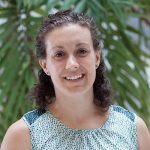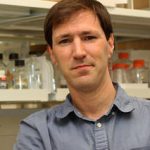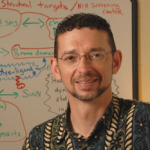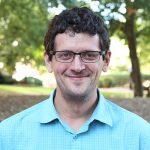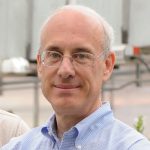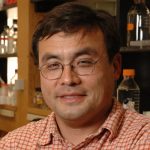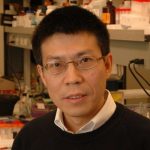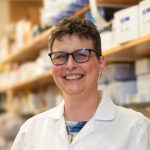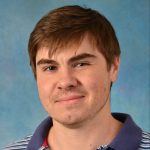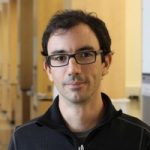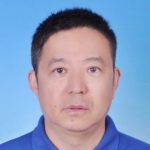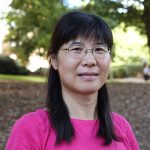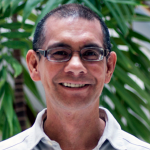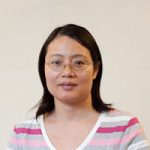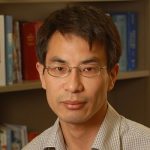Katelyn Arnold is a Research Assistant Professor in the Division of Chemical Biology and Medicinal Chemistry (CBMC). Dr. Arnold’s research interest is in therapeutic development of synthetic heparin. She uses chemoenzymatically synthetized oligosaccharides in various animal models to investigate the relationship between oligosaccharide structure and function to understand anti-inflammatory mechanisms. This work also involves pharmacokinetic studies using methods and standards specific for synthetic heparin.
Drug Discovery: Faculty and Staff
Jeff Aubé
ACCEPTING DOCTORAL STUDENTS
The Aubé laboratory uses synthetic chemistry to enable the study of biological pathways and as starting points for drug discovery. Current efforts in the group include the study of new opioids lacking side effects, new approaches for the treatment of tuberculosis, androgen biosynthesis inhibitor discovery, the search for RNA-protein interaction inhibitors, and the development of new synthetic methods.
Alison Axtman
The Axtman lab is devoted to characterization of the dark proteome, especially those proteins with underexplored roles in the brain. Our interests lie at the interface of chemistry and biology, with a focus on using small molecules, specifically potent and selective chemical probes, to explore and impact disease-propagating pathways. Active projects are aimed at finding pre-clinical small molecule candidates that, after further optimization, can help address the need for new therapeutics in human diseases. Our scientists are working to design and synthesize chemical modulators and develop screening assays. All data and reagents are openly shared to facilitate and expedite scientific advancement.
Albert Bowers
ACCEPTING DOCTORAL STUDENTS
Albert Bowers received his PhD in organic chemistry (synthetic methods) from the University of Illinois at Chicago. He carried out postdoctoral research (total synthesis) at Colorado State University before moving as an NIH sponsored fellow to Harvard Medical School (biosynthesis). He is a member of the UNC Lineberger Comprehensive Cancer Center and affiliate member of the Center for Integrative Chemical Biology and Drug Discovery.
Rafael Couñago
Rafael M. Couñago, PhD, is a Research Associate Professor in the Division of Chemical Biology and Medicinal Chemistry Department in the UNC Eshelman School of Pharmacy and a Principal Investigator at the Structural Genomics Consortium (SGC) at UNC. Rafael´s research group at SGC-UNC uses protein biochemistry, structural biology and cell-based assays to illuminate protein function and explore new therapeutic strategies for human diseases.
David Drewry
ACCEPTING DOCTORAL STUDENTS
The Drewry lab in focused on designing, synthesizing, evaluating, and sharing small molecule chemical probes for protein kinases. These tools are used to build a deeper understanding of disease pathways and facilitate identification of important targets for drug discovery. Through wide ranging partnerships with academic and industrial groups, the Drewry lab is building a Kinase Chemogenomic Set (KCGS) that is available to the community for screening.
Kevin Frankowski
Research in the Frankowski lab uses synthetic chemistry to develop new approaches for the treatment of unmet medical needs. Our current efforts focus on programs to treat metastatic cancer, hepatitis C virus infection and the development of chemical tools for studying dopamine and sigma receptors.
Stephen Frye
Dr. Stephen Frye is currently a Professor in the Center for Integrative Chemical Biology and Drug Discovery (CICBDD) which he previously directed at the University of North Carolina at Chapel Hill (UNC). Prior to joining UNC to create the CICBDD in 2007, Dr. Frye was the world-wide vice president of Discovery Medicinal Chemistry (DMC) at GlaxoSmithKline (GSK). Dr. Frye led DMC for seven years, overseeing five departments and more than 200 chemists in the U.S. and U.K. developing global protein target-class chemical science for GSK. During his 20-year career at GSK, the teams led by Dr. Frye successfully developed three FDA approved drugs: Avodart, a dual 5a-reductase inhibitor for treatment of benign prostatic hyperplasia, Tykerb, a dual erbB2/EGFR inhibitor for the treatment of metastatic breast cancer, and Pazopanib, a multi-targeted receptor tyrosine kinase inhibitor for the treatment of renal cell carcinoma and soft tissue sarcoma. As founding director and current faculty member in the CICBDD at UNC, Dr. Frye plays a key role in translational research through collaborative drug discovery projects with other UNC faculty. A clinical candidate from one of these projects created in the Center is now progressing through multiple human trials. In addition, his lab has established a leading program in the area of chemical biology of chromatin regulation with an emphasis on protein-protein interactions dependent upon lysine methylation. Dr. Frye has published more than 130 papers in the fields of organic and medicinal chemistry.
Lauren Haar
Our projects focus on investigating the role that refined spatial and temporal control of intracellular signaling cascades can play in the progression of cardiovascular injury. We use a research strategy involving plasmid and optogenetic protein engineering, high content screening, high resolution microscopy and physiologically based cell analysis. With this approach we hope to uncover new targets for therapeutic development by better defining signaling cascades that drive cardiovascular disease response.
Nate Hathaway
ACCEPTING DOCTORAL STUDENTS
The Hathaway lab was established at UNC with a founding idea that the group could make a contribution to understanding dynamic epigenetic processes by using unique chemical biology approaches they pioneered. Through the combination of protein bioengineering, synthetic organic chemistry, and mammalian cell-based model systems, they have created platforms that use chemically tethered enzymatic recruitment to specific chromatin loci to produce a host of mechanistic insights. The Hathaway group also has drug discovery programs to identify new small molecules that inhibit disease relevant epigenetic pathways both for research purposes and as potential future therapeutics.
Lindsey Ingerman James
ACCEPTING DOCTORAL STUDENTS
The James lab is interested in modulating the activity of chromatin reader proteins with small-molecule ligands, specifically potent and selective chemical probes, in order to open new avenues of research in the field of chromatin biology and potentially translate to compounds of therapeutic value. They are also interested in applying novel probe-based techniques, such as affinity labeling technologies, to the study of epigenetic regulators.
Michael Bruce Jarstfer
Michael Jarstfer, PhD, is an Associate Professor within the Division of Chemical Biology and Medicinal Chemistry and the Associate Dean for Graduate Education. He is also the Director of Graduate Studies for the Pharmaceutical Sciences PhD program. Dr. Jarstfer has expertise in drug target identification, high-throughput-screening, medicinal chemistry, and compound optimization for drug discovery as well as pharmacology in preclinical animal models.
David S. Lawrence
NOT ACCEPTING GRADUATE STUDENTS
The Lawrence lab works to understand the biochemical processes of the cell by studying them as they happen in the cell as opposed to studying them in vitro. He currently focuses on applying his discoveries to cancer detection and treatment and, to a more limited extent, inflammatory diseases.
Andrew L Lee
ACCEPTING DOCTORAL STUDENTS
Andrew Lee studies the role of conformational dynamics in protein function, conformational changes, enzyme catalysis, drug binding, and allostery. His laboratory uses a variety of biophysical and biochemical tools, especially NMR spectroscopy. NMR spectroscopy is a powerful approach that yields atomic-resolution molecular information and is uniquely sensitive to molecular fluctuations over a broad range of timescales.
Jian Liu
ACCEPTING DOCTORAL STUDENTS
Research in the Jian Liu group is focused on glycobiology and glycobiochemistry, an emerging field that emphasizes the biological functions of carbohydrates. We are particularly interested in understanding the biosynthetic mechanism of sulfated polysaccharides known as heparan sulfate and heparin.
Rihe Liu, PhD
ACCEPTING DOCTORAL STUDENTS
The Liu laboratory’s research interests focus on the development and application of novel drug target-binding affinity molecules by integrating directed molecular selection and evolution, ligand design and engineering, in vitro cellular and signaling characterization, and in vivo therapeutic efficacy studies in tumor mouse models. The Liu laboratory has extensive experiences in the design, synthesis, characterization, and delivery of diagnostic and therapeutic agents based on both polypeptides and polynucleotides.
Robert McGinty
ACCEPTING DOCTORAL STUDENTS
The McGinty lab studies molecular mechanisms of chromatin signaling. By pairing atomic precision protein chemistry with high resolution structural biology, they aim to understand how the nucleosome functions as a signaling hub for gene expression, DNA replication, and DNA damage repair in development and disease.
Eugene Muratov
Dr. Muratov served as a corresponding author on an approach used by regulators to initially screen new chemical products for toxic effects. They have proposed an improvement that could increase the accuracy of toxicity estimation to as much as 85 percent, saving millions of dollars and years of development time for new drugs and other products while improving safety.
Samantha Pattenden
ACCEPTING DOCTORAL STUDENTS
The Pattenden lab develops innovative techniques in chromatin-based therapeutic target discovery and cancer diagnostics. Our research program enables discovery of novel molecular targets, pathways and mechanisms. Our central strategy exploits tumor-specific changes in chromatin accessibility, a universal feature that is directly linked with transcriptional activation, DNA damage repair, replication, RNA processing, and nuclear organization.
Kenneth Pearce, Jr
Ken Pearce, Ph D is the director of the Center for Integrative Chemical Biology and Drug Discovery. Pearce’s primary expertise and interests are fundamentals of protein methods, biochemical and cell assay development, medium- and high-throughput screening, hit validation and mode-of-action, biophysical methods for characterizing protein-protein and small molecule-protein interactions, and structure-activity relationships for early drug discovery. He joined the center as director of lead discovery and characterization in mid-2015 after spending over 18 years at GlaxoSmithKline and legacy companies in the Molecular Discovery Research organization.
Konstantin Popov
The Popov Lab develops inventive, cutting-edge approaches to solve problems in modern computational structural biology and drug discovery. Their computational research, in collaboration with experimental screening and medicinal chemistry efforts in the Center for Integrative Chemical Biology and Drug Discovery enables the identification of novel chemical probes and drug candidates to advance understanding of biological processes. Some of their recent projects include:
• Identification and characterization of allosteric and cryptic binding sites
• Development of AI-driven methods for accelerated virtual screening (VS)
• AI approaches for DNA-encoded library (DEL)-guided virtual screening (VS) and new-generation DEL library designs
• Collaborative hit discovery and optimization projects
Paul Sapienza
Paul Sapienza is a research assistant professor in the Division of Chemical Biology and Medicinal Chemistry at the UNC Eshelman School of Pharmacy. His research aims to further understanding of the role of dynamics in biomolecular recognition, enzymatic catalysis, and allostery. He uses nuclear magnetic resonance spectroscopy to study protein dynamics on multiple timescales, while other tools such as calorimetry, crystallography, and kinetics serve to link dynamics with function. He is focusing on thymidylate synthase as it is an enzyme with a multistep catalytic cycle, is a cancer drug target, and exhibits negative cooperativity (allostery).
Scott Singleton
Scott Singleton is engaged in educational innovation and research. His work attempts to build on what is understood about memory and attention to devise, test, and implement effective teaching and learning strategies. His current work focuses on teaching that positively affects student engagement in the classroom, identifying core basic science concepts that serve as threshold concepts for pharmacy students, and evaluating the transfer of learning between courses in the professional PharmD program.
Junjiang Sun
Junjiang Sun is a Research Assistant Professor in the Division of Chemical Biology and Medicinal Chemistry (CBMC). Sun’s research interests focus on gene therapy for hemophilia, hemophilia associated joint disease (Hemophilia Arthropathy), by expressing bypassing agents (activated coagulation factor V, IX) via AAV vectors. This technology platform provides novel therapeutic approaches for rheumatoid arthritis (RA) and osteoarthritis (OA).
Alexander Tropsha, PhD
ACCEPTING DOCTORAL STUDENTS
Alex Tropsha, Ph.D., is an expert in the fields of computational chemistry, cheminformatics and data science. His laboratory develops new methodologies, software tools and applications in the areas of computer-assisted drug design, chemical toxicology, materials informatics, text mining, and health care informatics.
Xiaodong Wang
The Wang lab is interested in developing drug leads/candidates for kinase, phosphate kinase and protein targets identified by UNC faculty and external investigators. We have successfully used the structure- and/or ligand-based drug design approaches to deliver compounds to clinic (MerTK inhibitors such as MRX-2843) or licensing (IDH1 inhibitor, co-developed with NCATs). We will continue to apply the similar approaches for drug discovery towards new targets.
Tim Willson
The Willson laboratory is home to the US site of the SGC, an open science consortium that accelerates research on the lesser studied regions of the genome. The laboratory works closely with pharma companies and academic investigators to develop small molecule chemical probes for hundreds of dark kinases that are openly shared with the scientific community. Current research has led to the development of the Kinase Chemogenomic Set (KCGS) that contains selective inhibitors of more than 200 kinases as well as high quality chemical probes for several of the dark kinases.
Yongmei Xu
Dr. Xu co-authored the Heparin study with Dr. Jian Liu and Dr. Lindhardt. Heparin is a naturally occurring polysaccharide that prevents blood clotting, or coagulation, and has been in use since the late 1930s. A polysaccharide is a long chain of carbohydrate molecules.
Qisheng Zhang
ACCEPTING DOCTORAL STUDENTS
The Zhang lab studies lipid signaling pathways that are involved in human disease by developing novel chemical probes and technologies. They currently focus on discovering new bioactive lipids, developing small molecule modulators and biosensors for lipid metabolizing enzymes, and applying their research results to novel diagnosis and treatment of cancer, Parkinson’s disease, and antimicrobial resistance.
Jeff Aubé
ACCEPTING DOCTORAL STUDENTS
The Aubé laboratory uses synthetic chemistry to enable the study of biological pathways and as starting points for drug discovery. Current efforts in the group include the study of new opioids lacking side effects, new approaches for the treatment of tuberculosis, androgen biosynthesis inhibitor discovery, the search for RNA-protein interaction inhibitors, and the development of new synthetic methods.
David S. Lawrence
NOT ACCEPTING GRADUATE STUDENTS
The Lawrence lab works to understand the biochemical processes of the cell by studying them as they happen in the cell as opposed to studying them in vitro. He currently focuses on applying his discoveries to cancer detection and treatment and, to a more limited extent, inflammatory diseases.
Robert McGinty
ACCEPTING DOCTORAL STUDENTS
The McGinty lab studies molecular mechanisms of chromatin signaling. By pairing atomic precision protein chemistry with high resolution structural biology, they aim to understand how the nucleosome functions as a signaling hub for gene expression, DNA replication, and DNA damage repair in development and disease.
Yuriy Abramov, Ph.D
Dr. Yuriy Abramov is an Executive Director of Computational Chemistry and Data Science at J-Star Research Inc. with over 18 years of industrial experience. He has broad expertise in the area of Computational Drug Discovery and Development.
He has a proven track record for developing new ideas and approaches from the concept stage to successful implementation. His current interests include but are not limited to computational pharmaceutical solid state chemistry.
Stephen Capuzzi
Stephen J. Capuzzi is currently a Senior Research Scientist in Data & Computational Sciences at Vertex Pharmaceuticals. His research interests span small molecule drug discovery, cheminformatics, chemical data science, computational chemistry, and machine learning. He was named an American Chemical Society Division of Medicinal Chemistry Young Investigator in 2021.
Nikolay Dokholyan, PhD, MS
Thomas Passananti Professor and Vice Chair for Research, Department of Pharmacology
Thomas Passananti Professor, Department of Biochemistry & Molecular Biology
Scientific Program: Experimental Therapeutics
Sean Ekins, Ph.D.
Sean has over 26 years experience in pharmaceutical drug discovery. He graduated from the University of Aberdeen; receiving his M.Sc., Ph.D. in Clinical Pharmacology and D.Sc. in Science. He is currently Founder and CEO of Collaborations Pharmaceuticals, Inc. for which he has raised >$13M in grant funding and which is focused on using machine learning approaches for rare and neglected disease drug discovery.
Masuo Goto
Dr. Masuo Goto’s research focuses on chemical biology of cell cycle regulation and multidrug-resistant phenotype in cancer using small molecules inspired by unique natural products.
Rima Hajjo, PhD, MS, PharmB
Dr. Hajjo is a computational scientist with over 10 years of industrial experience in drug discovery and development. She also worked as a Solutions Scientist at Thomson Reuters IP & Science. Currently, Dr. Hajjo is an Assistant Professor at Al-Zaytoonah University of Jordan, a Board Member at the Jordanian Center for Epidemics and Disease Control, and a Chief Scientist in Computational Chemical Biology at the Office of the Advisor to His Majesty, King Abdullah II. Dr. Hajjo has a PhD degree in Pharmaceutical Sciences from UNC-CH and a post-graduate degree in Bioinformatics from Harvard University.
Peter Ho, M.D., Ph.D.
Peter Ho currently serves on the Board of Directors of Aravive Inc., the Scientific Advisory Board of Accent Therapeutics, and as a senior advisor to Overland Pharmaceuticals, D3 Bio Inc., and M4K Pharma. Previously, he served as Senior VP of the Oncology Center of Excellence in Drug Discovery at GlaxoSmithKline, Chief Medical Officer at Epizyme Inc, and co-Founder and President of BeiGene, Ltd. He has been directly responsible for the first-time-in-human dosing of 18 anticancer agents and has overseen the development of over 60 hematology and oncology compounds. He has directly overseen the clinical testing of over 60 oncology compounds which has led to eleven NCE or biologics approvals to date: Gleevec®; Arranon®; Tykerb®; Promacta®; Votrient®; Synribo®; Tafinlar®; Mekinist®; Sylvant®; and Rydap®, and Tazverik®.
Clark D Jeffries, Ph.D.
Clark Jeffries is a mathematician with expertise in predictive machine learning. Methods Jeffries has invented have been recently applied to clinical high-risk datasets, yielding novel approaches to address reproducible classification and to avoid overfitting. He is acquainted with both the promises and pitfalls of machine learning. Jeffries is also an expert in various mathematical modeling techniques, especially related to stability theory, graph theory, and causality. He is currently a bioinformatics scientist with Renaissance Computing Organization of the University of North Carolina at Chapel Hill. Formerly, he was a professor with Mathematical Sciences of Clemson University, then a designer with Microelectronics Division of IBM Corporation. At Clemson, he wrote more than 50 scientific papers and at IBM he became among inventors on several issued US patents. His total of current issued patents is 121.
Jian Jin, Ph.D.
Dr. Jian Jin is currently the Mount Sinai Endowed Professor in Therapeutics Discovery and Director of the Mount Sinai Center for Therapeutics Discovery at Icahn School of Medicine at Mount Sinai (Mount Sinai). He is also a tenured professor in Departments of Pharmacological Sciences, Oncological Sciences and Neuroscience, and a Co-Leader of the Cancer Clinical Investigation Program at The Tisch Cancer Institute at Mount Sinai. Dr. Jin is an internationally recognized medicinal chemist and chemical biologist with more than 20 years of experience in small-molecule drug discovery. His laboratory is a leader in discovering selective inhibitors of histone methyltransferases, biased ligands of G protein-coupled receptors, and novel degraders targeting oncogenic proteins. Dr. Jin has published >200 peer-reviewed papers and is an inventor of >60 issued U.S. patents and published international patent applications.
Dr. Jin received a Bachelor’s of Science degree in chemistry from the University of Science and Technology of China in 1991 and a PhD in organic chemistry from the Pennsylvania State University in 1997. After completing a post-doctoral training at the Ohio State University, Dr. Jin joined GlaxoSmithKline as a medicinal chemist in 1998 and had been a manager of medicinal chemistry from 2003 to 2008. In 2008, Dr. Jin joined the Division of Chemical Biology and Medicinal Chemistry at the University of North Carolina at Chapel Hill (UNC) as an Associate Professor. He had also served as an Associate Director of Medicinal Chemistry in the Center for Integrative Chemical Biology and Drug Discovery at UNC from 2008 to 2014. Dr. Jin was recruited to Mount Sinai as a professor with tenure in 2014.
Sergei Makarov, PhD
Dr. Makarov is the founding CEO of Attagene Inc., an RTP-based life science company that develops innovative tools for studying signal transduction. He was formerly an Associate Professor at the UNC School of Dentistry. Under his supervision, Attagene researchers have established a strong collaboration with the UNC scientists.
David M. Margolis, MD
Dr. Margolis is a Sarah Graham Keenan Distinguished Professor of Medicine, and Director, UNC HIV Cure Center. A clinician, virologist, and molecular biologist, he seeks to re-purpose old drugs and discover new ones to eradicate cells that are persistently infected with HIV, and cure this chronic viral disease. The effort has generated collaborations across disciplines at UNC, and with the pharmaceutical industry, and studies of basic cellular biochemical mechanism, using cutting-edge molecular tools and biochemical probes.
Kyoko Nakagawa-Goto, Ph.D.
David Nichols, Ph.D.
David E. Nichols PhD previously held the Robert C. and Charlotte P. Anderson Distinguished Chair in Pharmacology and in addition was a Distinguished Professor of Medicinal Chemistry and Molecular Pharmacology at the Purdue University College of Pharmacy. He was continuously funded by the NIH for nearly three decades and served on numerous government review panels. His two principal research areas focused on drugs that affect serotonin and dopamine transmission in the CNS. He began medicinal chemistry research on hallucinogens in 1969 and has been internationally recognized as a top expert on the medicinal chemistry of psychedelics (hallucinogens). He has published more than 300 scientific articles, book chapters, and monographs. In 1993 he founded the Heffter Research Institute, which has supported and funded clinical research with psilocybin and led the so-called “renaissance in psychedelic research.”
Vijayakanth Pagadala
Vijay Pagadala is Chief Operating Officer at Glycan Therapeutics and is involved in drug development including bioprocess engineering, API manufacturing and quality control. His research interests span molecular biochemistry, Structural biology, membrane proteins, enzymology and glycobiology. He served as Principal and co-investigator on several SBIR and STTR grants from NIH towards developing commercially valuable biomolecules for research and for therapeutic application. He values collaborations and is passionate about mentoring and teaching.
Lars Pedersen, Ph.D.
Dr. Marcey L. Waters
Dr. Waters is the Glen H. Elder, Jr., Distinguished Professor of Chemistry at UNC-Chapel Hill and Adjunct Professor in CBMC. Dr. Waters’ research focuses on developing new Chemical Biology tools for the study of protein-protein interactions that mediate epigenetic regulation, primarily methyllysine reader proteins. Dr. Waters’ expertise includes organic chemistry, genetic code expansion, mechanistic studies, and biophysical methods. She is the co-PI (with Dr. Jeff Aubé) of UNC’s NIH Chemistry-Biology Interface Training Grant.




